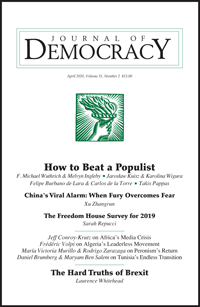
Viral Alarm: When Fury Overcomes Fear
The coronavirus outbreak has exposed the corrupt and rotten core of the Chinese Communist Party’s dictatorial rule over China. It is a moment of revelation. Can it also become one that leads to change?

Volume 31, Issue 2

The coronavirus outbreak has exposed the corrupt and rotten core of the Chinese Communist Party’s dictatorial rule over China. It is a moment of revelation. Can it also become one that leads to change?

Is there a recipe for defeating a populist? A novel campaign strategy based on inclusion and public responsiveness may show how to beat the odds in a competitive authoritarian system.
A grim narrative of the years since 1989 has buoyed Eastern and Central Europe’s populist parties in their rise to power. To win back voters, liberals must tell a more compelling story of the postcommunist era—and offer a stronger vision of the years to come.
Escaping the populist trap requires reversing the sequence that brings populists to power in the first place. The 2019 triumph of Greece’s liberal New Democracy party shows how victory can be achieved.
Populists have often turned to referendums to dismantle a democracy. Democrats should be wary of turning to the same tool to rebuild what was lost. It may only pave the way for populism’s return.
The 2019 election ended years of turmoil over the United Kingdom’s relationship with the EU, but challenges to national unity and parliamentary sovereignty are only beginning to come to a head.

Sub-Saharan African governments are clamping down on media freedom. More surprising is how many of their citizens appear to support this attack on the press.
A domestic pact may be needed to end a dictatorship, but what happens when that pact itself becomes one of the chief obstacles to deeper democratization?
Out of power and with promises to jumpstart a lagging economy, the fractured Peronists reunified and reclaimed the presidency. Now they must deliver what voters want.
In 2019, the global democratic recession deepened, while protest movements proliferated around the world, fighting largely without leaders or support from major democracies.
Algeria’s massive wave of protesters wanted to put an end to sham elections. While the leaderless movement succeeded for a time, its failure showcased the lengths to which a country’s ruling elite will go to maintain its hold on power.
Ordinary citizens in East Asia, Latin America, and Africa are increasingly disappointed with democracy and its ability to deliver.
A review of Democracies Divided: The Global Challenge of Political Polarization, edited by Thomas Carothers and Andrew O’Donohue.
Reports on elections in Afghanistan, Algeria, Azerbaijan, Cameroon, Comoros, Croatia, Guyana, Iran, Mali, Peru, Saint Kitts and Nevis, Slovakia, Taiwan, Tajikistan, Uzbekistan, Vanuatu, Tunisia.
Excerpts from: an open letter on the death of Wuhan doctor Li Wenliang; a speech by Taiwanese president Tsai Ing-Wen; a pact by the mayors of Budapest, Bratislava, Prague, and Warsaw.